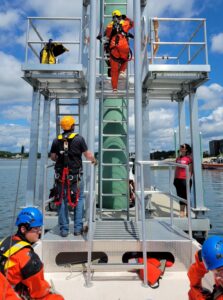 HYANNIS – Can running actually be good for your knees?
HYANNIS – Can running actually be good for your knees?
That’s the finding of a new study that looked at how running may actually promote knee health and protect against developing inflammatory diseases like arthritis. What they found might just make you want to lace up your sneakers and give it a go.
Cape Cod Hospital orthopedic surgeon Jesse Affonso, MD thinks this is a pretty good idea.
“We get asked almost weekly if running is bad for you. And honestly, I would have said yes before seeing this study,” he said. “It makes intuitive sense that continual pounding on your knees is bad for you. Yet, that being said, former marathoners or regular runners never seem to need knee replacements.”
There is no better anecdotal evidence needed than the career of famed East Dennis marathoner Johnny Kelly, who died in 2004 at age 94. He ran the last of his 112 marathons at age 84 and still had the knees he was born with.
So what could it be about running that might dispel the long-held notion that it is bad for your knees? Researchers at Brigham Young University in Provo, Utah wanted to find out.
Previous research has already demonstrated that long-term runners are less likely to develop osteoarthritis than their non-running peers. The goal of the study was to determine what impact joint loading (impact from running) has on a person with healthy knees, what effect it has on the concentration of inflammatory-related proteins contained within the knee, and the relationship between the two.
A Small Study
A small group of 15 runners with healthy knees participated in the study. They ranged in age from 18 to 40 and were predominately men (11 men and 4 women).
Each participant had their blood taken and underwent a needle extraction of a small amount of synovial fluid from their right knee before and after running for 30 minutes at their own pace.
In between, they were transported by wheelchair to eliminate any potential effect of walking.
A week later, the same group remained sedentary for 30 minutes and underwent the same fluid retrieval sequence as before.
Synovial fluid provides lubrication to keep joint movements smooth and easy.
Retrieving samples of synovial fluid proved to be difficult on some participants, so in the end only six runners were able to complete the study.
The results demonstrated that in almost all of the participants there was a decrease in the concentration of cytokine proteins, or those linked to inflammation, in the knee after running. Furthermore, higher levels of cartilage oligomeric matrix protein (COMP), which is associated with cartilage turnover – a positive event – was detected in the blood stream.
In the resting group, the results were the opposite, indicating that being sedentary increases the concentration of inflammatory markers.
One of the proteins found in elevated levels in osteoarthritis and rheumatoid arthritis patients was found in decreasing concentrations in the running group in this study. Researchers concluded that running triggered the movement of these potentially damaging substances out of the knee and into the bloodstream where they would no longer provoke an inflammatory response.
The Take-Away
“This study is the beginning of research trying to figure out the question: Is there biomechanical or biochemical protection from running?” said Dr. Affonso. “If your body is secreting these anti-inflammatory agents that are protecting your knees, wouldn’t that be the best of all worlds?”
He cautioned that while the findings are encouraging, they were derived from a very small population of participants, making further study necessary to say for certain.
He is excited about the direction of this kind of research and sees it as one more confirmation that getting off the couch and moving your body is the best way to protect against degenerative diseases like arthritis.
Dr. Affonso said he is unaware of any study that says that running causes arthritis, and is pleased to see one that suggests that it might actually be protective.
“We’ve always known the benefits of doing aerobic exercise and running, especially for cardiovascular health. It’s even better to think that it may prevent degenerative joint disease as well.”
In runners, the most frequent knee complaint requiring medical treatment is for tears in the meniscus, the main cushioning within the knee, he said. It is not for degenerative joint disease.
If you are thinking about taking up running, Dr. Affonso says, “go for it!” He also offers a few important tips to remember:
Get your legs in shape before running by doing some strengthening exercises for your quadriceps and hamstrings.
Be realistic in your distance goals, starting slowly and building up distance over time.
Never run if you are in pain.
Always consult with your doctor before you start any new exercise plan to make sure it is safe for you to do so. This is especially true for people with heart issues.






















